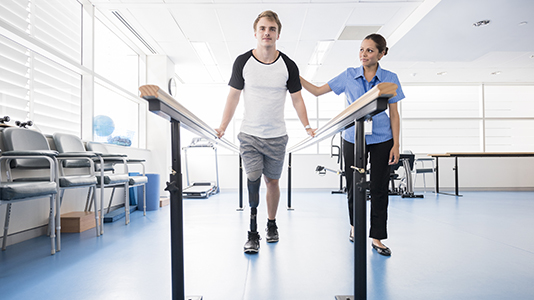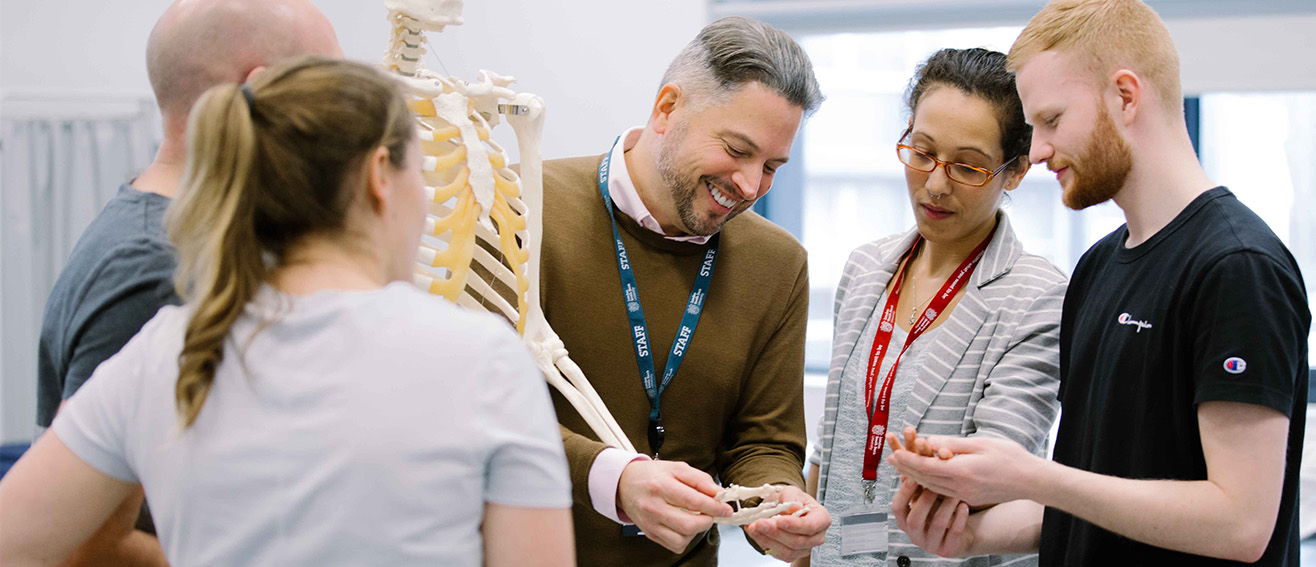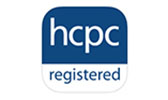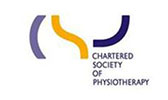Overview
Due to high demand, this course is closed to new applications for 2024. You might instead be interested in pre-registration postgraduate courses in Sport Rehabilitation or Nursing.
Effective and resourceful
Become an effective and resourceful physiotherapist, comfortable working within a rapidly changing healthcare environment.
Physiotherapists play an increasingly central role in enabling others to improve their health, wellbeing and quality of life by managing pain and preventing disease. They use a broad range of treatment approaches focused on restoring movement and function, often following illness or injury.

We hold strong links with physiotherapists working in health and social care, as well as the private sector and in social enterprise settings across the Greater London area. We utilise the expertise of clinicians to contribute to the course design, teaching sessions and provision of practice placements.
Our programme provides an accelerated 2-year route for graduates with a first degree in a related field.
Why Physiotherapy at LSBU?check-circle This course is approved by the Health and Care Professions Council (HCPC) and accredited by the Chartered Society of Physiotherapy (CSP). medkit Course led by a teaching team that includes active researchers and clinicians. heartbeat Our dedicated facilities include clinical skills labs and outstanding virtual learning environments on campus – as well as access to the gym facilities. rocket LSBU Health and Social Care graduates are the second highest paid amongst all London Modern university graduates, and the sixth highest in the UK one year after graduating (DfE LEO data 2022). user-md Students on this course could be eligible to receive a non-repayable amount of up to £11,000 per academic year with the NHS Learning Support Fund.
| ModeFull-time | Duration2 years | Start dateSeptember | Application codeB162 | Application method UCAS |
Location
London South Bank University student union is located at 103 Borough Rd, London SE1 0AA.
If you are visiting our Southwark Campus, you may wish to use our downloadable campus map (PNG File 466 KB). For information on accessibility, see our DisabledGo access guides. See our location page for more details.
Entry Level Requirements
Want to start your course this September? call 0800 923 8888 for entry requirements.
- 2:2 UK Honours degree in a subject related to science or health, such as biology, sport science, physiology, behavioural science or health science, ideally with human anatomy and physiology content
- Personal qualities and values in line with those expected by the NHS Values
- Completion of at least one week of work experience in a physiotherapy setting, preferably in either the NHS or other hospital setting
Personal statement
Please provide a concise personal statement that provides evidence of the specific skills, qualities, values and attributes that you believe demonstrate your;
- Motivation to become a Physiotherapist
- Specific personal skills, qualities and attributes that you bring to the courses and the profession.
- Ability to work independently and in small groups within an accelerated professional programme at master’s level.
Assessment and interview
If you are shortlisted, you will be invited to complete an interview. The interview panel consists of LSBU staff, lecturers, service users and clinicians.
English language
Those whom English is not their first language must achieve a minimum score of 7.0 overall or equivalent with not less than 7.0 in the listening and reading sections and not less than 7.0 in the writing and speaking sections for the International English Language Test Score (IELTS) at the time of application.
Choose your country
Select country here:
Missing English and Maths qualifications?
If you do not have the required English and Maths qualifications needed to satisfy the entry requirements for this programme, we have courses available at our partner College that you can take to upskill in these areas. Find out more at South Bank College.
United Kingdom
£9535
Tuition fees for home students
International
£21758
Tuition fees for international students
Tuition fees are subject to annual inflationary increases. Find out more about tuition fees for Undergraduate or Postgraduate courses.
-
Full-time
full-time
MSc Physiotherapy (FT) - Year 1
UK fee: £9535 International fee: £18600 AOS/LSBU code: 5009 Session code: 1FS00 MSc Physiotherapy (FT) - Year 2
UK fee: £9535 International fee: £21758 AOS/LSBU code: 5009 Session code: 2FS00
Possible fee changes
The University reserves the right to increase its fees in line with changes to legislation, regulation and any governmental guidance or decisions.
The fees for international students are reviewed annually and, additionally, the University reserves the right to increase tuition fees in line with the RPIX measure of inflation up to 4 per cent.
Scholarships
We offer several types of fee reduction through our scholarships and bursaries. Find the full list and other useful information on funding your studies on the scholarships and fee discounts page.
Fee status
Please check your fee status and whether you are considered a home, EU or international student for fee-paying purposes by reading the UKCISA regulations.
Funding for pre-registration postgraduate programmes
Since August 2018 new postgraduate pre-registration nursing, midwifery and allied health professional students have been able to access loans from the Student Loans Company. Accessing loans provides at least 25% more up-front living cost support whilst you study. You will also have access to the Learning Support Fund, which is administered by the NHS Business Services Authority, for support while attending clinical placements.
Background to these changes can be found on Gov.uk.
Council of Deans have prepared a briefing paper and Student Finance have outlined who qualifies. The Funding Clinic provides further information on what support is available.
NHS Bursary will produce guidelines and information once the information has received parliamentary approval.
International students
The course is not currently open to international students.
International (non Home) applicants should follow our international how to apply guide.
Home
| Mode Full-time | Duration 2 years | Start date September | Application code B162 | Application method UCAS |
This course is not open to international students.
See our admissions policy (PDF File 1,043 KB) and complaints policy (PDF File 516 KB).
Accommodation
Students should apply for accommodation at London South Bank University (LSBU) as soon as possible, once we have made an offer of a place on one of our academic courses. Read more about applying for accommodation at LSBU.
Finance
It's a good idea to think about how you'll pay university tuition and maintenance costs while you're still applying for a place to study. Remember – you don't need to wait for a confirmed place on a course to start applying for student finance. Read how to pay your fees as a postgraduate student.
Prepare to start
We help our students prepare for university even before the semester starts. To find out when you should apply for your LSBU accommodation or student finance read the How to apply tab for this course.
Enrolment
Before you start your course we’ll send you information on what you’ll need to do before you arrive and during your first few days on campus. You can read about the process on our Enrolment pages.
The course is designed to facilitate the students personal, academic and professional development such that the will meet the HCPC standard of proficiency for registration as a Physiotherapist and will have an understanding of the professions broad scope of practice. The largest area of practice remains the clinical sphere and this forms the largest focus within the programme with students being exposed to and developing competence in the broad scope of established and emerging clinical practice areas. Students will have experience of all the pillars of Physiotherapy practice, namely:
Physiotherapy has 4 domains of practice, being:
During the course students will learn how to support the development and learning of their patients. As students progress through the course, they will also study research methods, as well as other methods and mechanisms for knowledge generation and dissemination. Students will study the political and policy context of current health service delivery along with concepts around leadership, quality and change. This learning will support students in developing their skills so that they are not just competent clinical physiotherapists, but also effective agents for change and social justice.
Year 1
- Foundations of Physiotherapy Practice (40 credits)
This module provides students with the foundation knowledge of anatomy, pathophysiology and psychosocial factors, as well as the professional values, that underpin effective physiotherapy practice.Students will gain an understanding of how biological, physical, psychological, and social factors impacts on the health and wellbeing in individuals and populations.
Students will apply their knowledge in a practical setting through the use and development of physical assessment skills using a person centred approach.
- Treatment and Management for Physiotherapy Practice (40 credits)
This module introduces students to concepts underpinning the treatment and management of individuals as they present for physiotherapy across the life cycle. Students will also explore the role of physiotherapy in promoting health and wellbeing and develop the clinical knowledge and skills necessary to work with individuals in meeting their therapeutic and rehabilitation goals whilst on placements. - Physiotherapy Practice Placements 1 (0 Credits)
This module affords students the opportunity to apply their learning in the practice setting. Students will apply the theoretical knowledge and skills learnt in academic module/s, in the practice environment in one of the 4 pillars of physiotherapy practice (Leadership, Education, Research and Clinical).Prior to undertaking their placements, students will engage in a simulated practice experience to help them to prepare and better understand the cognitive and affective challenges of experiential learning in the practice setting.
Year 2
- Contemporary Issues in Health and Social Care (40 credits)
This module will provide students with an understanding of the current healthcare policies and their impact upon the provision of health and social care. It will build on knowledge achieved on practice placements and other areas within the course, looking formally at existing and emerging government initiatives across health and social care.The legal and policy frameworks governing healthcare practice, along with their underpinning evidence, are explored and critically appraised in relation to the provision of patient-centred care and evolving practice in health and social care.
Students will explore leadership, quality improvement and change and look at strategic, evidence-based approaches to change management in a range of environments. Students will then consider how they might use these skills to deliver the service development needed to support emergent areas of practice.
- Physiotherapy Practice Placements (20 credits)
This module affords students the opportunity to apply their learning in the practice setting. Students will apply the theoretical knowledge and skills learnt in academic module/s, in the practice environment in one of the 4 pillars of physiotherapy practice (Leadership, Education, Research and Clinical). Students will develop their critical thinking skills and application of evidence-based principles to their practice in preparation for working as an autonomous practitioner by the end of year 2. - Physiotherapy Research Project 2 (0 credits)
This module provides the student with an opportunity to undertake, and disseminate, an original piece of research. Students will work through the process of planning, managing, conducting, and writing up a research project related to an area of physiotherapy practice. Students will write up their findings in the style of an academic journal and present their findings in the form of an academic conference poster which they will be asked to defend.
Careers
Employability Service
At LSBU, we want to set you up for a successful career. During your studies – and for two years after you graduate – you’ll have access to our Employability Service, which includes:
- Free employability workshop and events for student all year round, more details can be found on our event section.
- Online board where you can see a wide range of placements: part-time, full-time or voluntary. You can also drop in to see our Job Shop advisers, who are always available to help you take the next step in your search.
- LSBU Careers Hub offering group workshops on CVs, interview techniques and support, guidance on future careers, as well as loads of career resources, connecting you with employers, exciting events, 1-1 support and relevant workshops.
Our Student Enterprise team can also help you start your own business and develop valuable entrepreneurial skills.
Physiotherapists play a key role in enabling people to improve their health, wellbeing and quality of life. They use a broad range of treatment approaches focused on restoring movement and function, often following illness or injury. Physiotherapists often work within a multidisciplinary team and may do this in a variety of clinical environments such as outpatient clinics, inpatient wards, in the patient's home, or in a sport or performance setting.
LSBU has collaborative research links with Guy's and St Thomas' NHS Foundation Trust Therapies department and with other key healthcare providers in the independent sector. This includes community, acute and specialist settings, reflecting the diverse nature of physiotherapy practice.
Placements
This course is planned to ensure that students complete the requisite number of hours in both theory and practice which builds knowledge across complex and. Academic and clinical practice blocks are structure to help you link effective theory to practice. Throughout your assessed practice placements, you will complete a minimum of 1,000 hours in local NHS organisations as well as community, private and voluntary sectors agencies. The LSBU Physiotherapy Practice Placement team take responsibility for allocating practice placements. As we believe in supplying well-rounded experiences, we will always try but can't always guarantee to allocate placements within 2 hours of your registered term time home address.
Placements include comprehensive contemporary experience across this range of sectors and settings can include acute, long term, inpatient and community environments. At least one of your placements will be in a speciality area such as respiratory, neurology, musculoskeletal systems, orthopaedics, medicine, obstetrics and gynaecology, or working with elderly, amputee or paediatric patients.
Year 1: 2 x 6 week practice placements (max 450 hours combined)
Year 2: 3 x 6 week practice placements (max 675 hours combined)
Teaching and Assessment
This course takes a blended approach to learning. It provides a range of learning formats and teaching delivery styles – and allows an individual approach, providing you with some flexibility in your preferred learning style.
Interactive lectures will introduce key subject matter. Practical sessions, small group teaching and demonstrations will be used to facilitate skills development.
A range of other approaches will be incorporated into students’ learning which can include online worksheets, guided independent study, e-learning, peer group learning, and group discussions.
When it comes to assessment, we use a variety of approaches to promote different skills and abilities while reflecting the nature of the module of learning. The main rationale for choosing the assessment method is helping students in the development of a wide range of professional knowledge and skills. The types of assignments demonstrate progression of skills and abilities as students’ progress on the course. Typical assessments include written examinations, written assignments, verbal (case study) presentation, practical examination and clinical assessments.
Personal tutoring
As a Health and Social Care student, you will be allocated a named tutor during your first three weeks at LSBU. The role of your tutor is to be your primary contact for academic and professional development support.
Your tutor will support you to get the most of your time at LSBU, providing advice and signposting to other sources of support in the University. They should be the first person at the university that you speak to if you are having any difficulties that are affecting your work. These could be academic, financial, health-related or another type of problem.
You will have appointments with your personal tutor at least once a semester for 45 minutes throughout your course. You can contact your tutor for additional support by email or phone.





